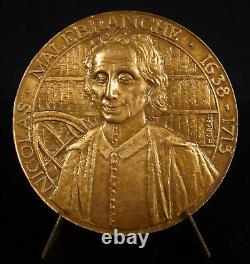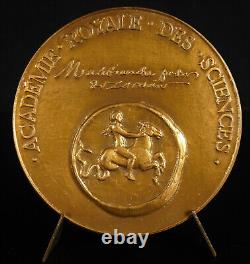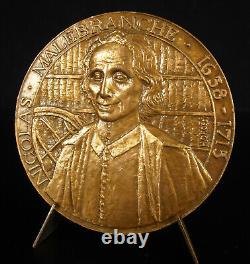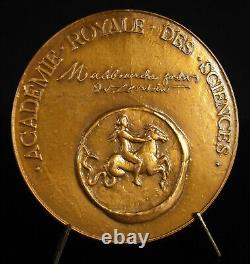Medal Nicolas Malebranche Philosopher H Drops 1960 Academy Royal of Sciences





Bronze medal, of the Paris Mint (Cornucopia hallmark from 1880). Hallmark on the edge (mark on the edge) : cornucopia + bronze.
The support is not for sale. The stand is not for sale. Nicolas Malebranche, born in Paris on August 6, 1638 where he died on October 13, 1715 (same years of birth and death as the French king Louis XIV), is a French philosopher, Oratorian priest and theologian. In his work, he synthesizes the thoughts of Saint Augustine and that of René Descartes.
He also developed a profoundly original thought, of great conceptual unity, which integrated the new sciences of the time while seeking to conform to the dogmas of Christianity. Through his spirit, which is both innovative and synthetic, he manages to build a remarkable explanatory system which intends to resolve all questions and all problems by relying on the idea of?? Malebranche is primarily known for his theses of the irremediably fallen soul of man, the vision of ideas in God and occasionalism, which together allow him to demonstrate the fully active role of God in every aspect of the world as well as the complete dependence of the human soul on Him.
For Malebranche, there is nothing which, thought correctly, does not bring us back to God. His philosophy is thus essentially religious, but with a marked rationalist character, because life according to reason is for him an integral part of life according to religion.
By the height of his thinking as by the nature of the theses he supports, Malebranche is sometimes nicknamed the Christian Plato. But the theological and moral consequences implied by his writings led to his doctrine being often judged harshly by the clerics and laymen of his time, Jansenists or Jesuits, some of whom attacked him with great violence, and succeeded in bringing to light'Index part of his publications. The quality of his literary style is nevertheless recognized by all, distinguished by the purity, elegance and clarity of the language, as well as by the abundance and skill of his figures of speech.
Today, Malebranche is considered in France as one of the greatest writers of his time, although the literary study of his work is neglected. On a philosophical level, he is also described as "the greatest metaphysician that France has ever had" by the philosopher Étienne Gilson1.
Even at the time of the Oratorian, Pierre Bayle considered his work as "a work of superior genius, and one of the greatest efforts of the human spirit"2. It was perceived from the 18th century as the last lightning bolt from the "French sky", preceding the eclipse of metaphysics during the Age of Enlightenment. Nicolas Malebranche was born in Paris during the summer of 1638. His father was treasurer of Richelieu, also advisor to the king3, he was the last of ten or thirteen children (the number varies depending on the sources) and had the same first name as his father.His mother is Catherine de Lauzon, whose brother was viceroy of Canada and councilor of state3. Due to a malformation of the spinal column, he took lessons at home until the age of sixteen and then studied at the Collège de la Marche where in 1656 he obtained the degree of master of arts at the University of Paris. He then studied theology for three years at the Sorbonne, although he did not appreciate its methods of argument3. Appointed secretary to the king in 1658, Malebranche entered the Congregation of the Oratory in 1660, shortly after the death of his mother, then of his father, within a few weeks of each other.
He was ordained a priest there in September 1664, the same year in which he said he read with great enthusiasm Descartes' Treatise on Man, which had just appeared more than thirty years after its writing3. In 1699, as a physicist and mathematician, he became an honorary member i. Unpensioned of the Royal Academy of Sciences, which was then one of the greatest places for the development of knowledge, in direct competition with the Royal Society of London. From the 1660s, Malebranche spent most of his time in his cell at the Oratory in Paris, rue Saint-Honoré, where he remained for almost fifty years without exercising any regular ministry3. He traveled little and only made two trips, one to Normandy in 1685 for a mission to "new converts", and the other to Périgord in 1688. But his writings were widely distributed across Europe and traveled during his lifetime to China, where Jesuit missionaries reproduced them. In fragile health, Malebranche suffered from permanent fatigue and was operated on several times for gallstones.Described as solitary, strange, meditative and pious, he composed his works in silence, sometimes retiring to one of the congregation's country houses to work more quietly. For the most part, his life is intertwined with his activity as a philosopher, scholar and writer, punctuated nevertheless by numerous passionate quarrels with those who criticize his theses3. Anecdotes that nothing attests are popularized by many biographers to ridicule the theses or the character of MalebrancheN 1.
Thus, as a supporter of the thesis of animal-machines, Malebranche would have kicked away the pregnant dog at the Oratory on the pretext that "it [an animal] does not smell" N 2, and his only attempt in matter of poetry would have resulted in this simple couplet: "This beautiful day is the most beautiful weather in the world for riding on land and on the water"4. According to another anecdote, Malebranche died as a result of the anger which seized him during a discussion with George Berkeley, passing through Paris, while he had previously expressed his aversion to "dispute"4.
A mausoleum was erected for him in 1733 at Mesnil-Simon in Eure-et-Loir, in front of the Saint-Nicolas church Logo historic monument Classified MH (1963)5. Doctrine In the 17th century, René Descartes opened the perspective of a new science and a new philosophy based on rationality. Metaphysical Metaphysics occupies a central place in Malebranche's thought.
It serves as the foundation of science, religion and morality. Inseparable from theology, Malebranche's metaphysics is theocentric, affirming the role of God as the sole principle. God is interpreted as a rational agent; he therefore did not choose the best of all possible worlds (as Leibniz maintains), but only the best possible world achievable by the simplest ways, the only ones worthy of the perfection of his being. Ideas as archetypes Very influenced by the Cartesian conception of knowledge, Malebranche considers the "clear and distinct idea" as the type of perfect knowledge6. But while Descartes, then Spinoza and the Cartesians, affirm that any other kind of knowledge is an "obscure and confused idea", Malebranche greatly innovates on this point.
For him, everything that is not known by clear and distinct idea is not known at all by idea, and the notion of obscure and confused idea as an imperfect or defective type of knowledge has no place in his system6. In Descartes, ideas were the "images" of things which contained "objectively", in the very content of their representations, what things contained "formally", objective existence being of a lower degree than that of formal existence. Now it is a long quarrel of eleven years which begins with the Jansenist theologian.
His father was treasurer of Richelieu, also advisor to the king3, he was the last of ten or thirteen children the number varies depending on.

